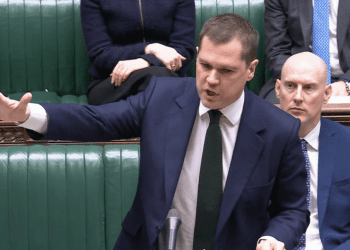The prevailing narrative of Keir Starmer’s first year in office, which critically coloured his inaugural anniversary as PM last week, is one of a leader besieged by the “insurgent right”.
Nigel Farage’s Reform UK, an upstart offshoot of the Brexit Party, has risen to occupy a consistent first place in the polls. The former UKIP leader has cannibalised the Conservative Party’s support base with an uncompromising ideological offer that embraces an anti-establishment posture.
In doing so, Reform has smashed political rules that once seemed self-evident: above all, that the UK’s electoral system, First Past the Post (FPTP), erects effectively impenetrable barriers to entry. Under the system, support for a party must be at once localised and widespread. Historically, insurgent outfits have failed to gain a foothold in parliament, let alone rival the seat count of the established, mainstream parties. Farage’s career trajectory prior to Reform represents exhibits A through Z.
But Farage’s recent success — at the 2024 general election, at milestones since and in the opinion polls — has precipitated a radical reappraisal of what is possible under the current rules of the game. Disruption is suddenly imaginable; Reform UK’s parliamentary “bridgehead”, and its arriving battalions, are a proof of concept.
It is little surprise, therefore, that other prospective and/or wannabe insurgents have taken note.
The initial commentary on Zarah Sultana’s announcement of a new insurgent left political party treated its unquestionably chaotic nature. In a summary statement posted to social media on Thursday evening (a time better suited to burying news than founding parties), Sultana announced her resignation from Labour — a year after she had the party whip suspended in parliament. That came after she backed an amendment to the king’s speech calling on the government to scrap the two-child benefit cap.
The independent MP said she and Jeremy Corbyn, the former Labour leader, would “co-lead the founding of a new party” — a curious and oddly specific choice of words.
“Westminster is broken but the real crisis is deeper”, Sultana said, promising an alternative to “managed decline… broken promises” and “barbarism”.
It soon became apparent that Sultana’s premature announcement had caught Corbyn off guard. Sunday Times journalist Gabriel Pogrund, who literally wrote the book on Corbynite disarray, reported that the former Labour leader was “furious and bewildered” at Sultana’s actions, adding: “I understand [he] has not agreed to join the new left party.”
Corbyn’s silence corroborated the story — and so did his belated statement. On Friday, he congratulated Sultana on her “principled decision to leave the Labour Party”.
The independent MP, by nature a non-confrontational and unhurried politician, added: “I am delighted that she will help us build a real alternative.
“The democratic foundations of a new kind of political party will soon take shape. Discussions are ongoing — and I am excited to work alongside all communities to fight for the future people deserve.
“Together, we can create something that is desperately missing from our broken political system: hope.”
Pogrund’s reporting has since suggested that Sultana deliberately bounced Corbyn into going public. The tactic looks to have been a successful one. Novara Media reckons a steering committee, featuring independent MPs and wider progressive types, has now voted in favour of a “Sultana-Corbyn joint ticket”.
***Politics.co.uk is the UK’s leading digital-only political website. Subscribe to our daily newsletter for all the latest news and analysis.***
A Tale of Two Insurgencies
All this said, the nature and detail of Sultana’s pronouncement haven’t altered the substance of the threat Starmer faces from the left. It mostly confirms what has already been long-assumed: a left-of-Labour party will be formed with Corbyn and Sultana involved. On Wednesday evening last week, 24 hours before Sultana’s statement, Corbyn vowed to establish an “alternative” to Labour. And unlike some of her ex-Labour colleagues suspended in July last year, Sultana has made no effort to gain re-entry into the PLP (Parliamentary Labour Party). Her criticism has only intensified.
For some observers, Sultana’s intervention merely symbolised the chaos that upstart parties have historically devolved into. A recurring quip mocked the apparent “split” between Sultana and Corbyn — before anything resembling a party had actually formed. Westminster and its watchers experienced a collective déjà vu: politics has advanced into unlikely places since Corbyn’s leadership of the Labour Party, but his tumultuous tenure has not been fast forgotten.
And yet, to dismiss this venture on the basis of its shambolic launch would mark a major miscalculation. The seeds may have been thrown erratically, but they fall on fertile soil.
On a checklist of my own making — comprising the elements/circumstances a political party must enjoy to successfully disrupt the status quo — a Sultana-Corbyn vehicle passes on several counts.
There are clear pre-existing networks of discontent, with Starmer and mainstream politics, which the party can exploit. Check. It has a clear, resonant message, bolstered by a narrative of betrayal aimed at an embattled, unpopular governing party. Check. It would promote a distinctive, anti-establishment position at a time of widespread disillusion with politics. Check. It has a clear target audience: voters positioned on the left and motivated variously by progressive causes. Check. It has a ready activist base who would be willing to dedicate time to the founding and development of the party. Check. It has a policy platform that could pivot between general grievances and single-issue concerns. Check. Indeed, it would have ample ammunition: concerns on welfare proposals, foreign policy, fiscal policy, SEND provision, rhetoric on immigration and — presumably — several unknowable, unforeseen policy flashpoints. It would be able to take up space in the modern media environment, on account of its predominantly young activist base. Check. (Sultana has more followers on TikTok than any MP except Farage). And finally, in emerging (effectively) from the Labour Party, it has a batch of figures who could be persuaded to defect. Check. Dramatic defections serve as a signal of momentum and credibility as a political force.
Reform has proved that an insurgent model, such as this, can thrive. In a mainly methodological and stylistic sense, a Corbynite copycat vehicle looks like a credible venture. Moderate types could learn to regret mocking it as a fringe fantasy.
Indeed, in Jeremy Corbyn, the party has an individual with wide public recognition. According to YouGov, he has a popularity rating of 22 per cent (at time of writing). While that is far from high, it makes him the 4th most popular Labour-adjacent political figure. (Keir Starmer’s popularity rating is 27 per cent by comparison).
Crucially, like Farage, those voters who identify with his politics tend to be highly motivated — a crucial point in the development of an “insurgent” party, and reflecting a possible “floor” of support. That is the nature of an insurgent’s appeal: they are often widely disapproved of. 52 per cent “dislike” Corbyn; 40 per cent “dislike” Farage (via YouGov again).
But in a time of multi-party politics, a motivated base can be enough to get an outfit onto the field and into the public eye. Indeed, in isolated instances, this mode of politics has already proved successful: Corbyn’s Independent Alliance currently boasts five MPs — more than Reform’s “bridgehead” (following the suspension of James McMurdock). In other areas, senior Labour figures were run close by the very so-called “Gaza independents” likely to be brought under the umbrella of a left party by the time of the next election. Meanwhile, the Green Party won four seats — including one from Labour in Bristol Central (ex-shadow cabinet minister Thangam Debbonaire’s seat).
***Politics.co.uk is the UK’s leading digital-only political website. Subscribe to our daily newsletter for all the latest news and analysis.***
Red-Green Menace
Significantly, these electoral breakthroughs came before Starmer emerged as prime minister on 5 July 2024. The opportunities for a left party have only proliferated since.
Logistical problems await, of course: some senior Labour figures on the left, like John McDonnell and Diane Abbott, have stressed their loyalty to Labour. (Although McDonnell is an independent MP; he had the whip suspended alongside Sultana).
But the biggest possible roadblock (electoral system aside) remains the ability to build a cohesive and disciplined internal structure. The groups and causes a left party would unite under one banner would be eclectic from the outset — creating a series of challenges around unity of purpose and messaging. Similarly, on the insurgent right, Reform UK has struggled to find quality candidates. Farage relies mostly on defections for his candidate stock. Such dilemmas await a party of the left.
Nor do we know the name of the party — a perennial pitfall for political start-ups. (Farage stole Reform from a Canadian outfit of the same name that eventually merged into, or reverse-took-over, the country’s mainstream Conservative party).
But there are also logistical opportunities: Zack Polanski, who is running to be leader of the Greens, has signalled he would be willing to work with a new party of the left. Polanski, a self-described eco-populist, reacted to Sultana’s statement a mere 30 minutes after it was posted — long before Corbyn, her alleged “co-leader”. He commented: “Anyone who wants to take on the Tories, Reform and this failing Labour government is a friend of mine.
“Looking forward to seeing what this looks like in practice.”
The post was widely shared, achieving over 10,000 likes, reflecting at least an online enthusiasm for some Green-Red blend. Indeed, this merger is arguably already in motion: in recent weeks, James Meadway, a former adviser to John McDonnell, and commentator Grace Blakeley have both joined the Greens to back Polanski. They have encouraged like-minded lefties to join the Greens by 31 July, the deadline, to vote for eco-populism.
In the event that Polanski wins the Green leadership — the contest culminates in August and he is competing with (and beating) rural conservationist MPs Adrian Ramsay and Ellie Chowns — some alliance would be likely, and surely the worst case scenario for Starmer.
Polanski and Sultana in particular, are giving political definition, and crucially institutional shape, to progressive disillusion with this Labour government. How their outfits eventually interact will be crucial in determining progressive success in a multi-party political order.
Notably, of the 40 seats where the GPEW (Green Party of England and Wales) and its sister parties finished second in the 2024 election, 39 are currently held by Labour.
The Sultana of swing (voters)
Implicit in the Labour government’s political strategy, spearheaded by No 10 chief of staff Morgan McSweeney, is the cold calculation that progressive voters will return to Labour by the time of the next election — if only to support the primary opposition to Nigel Farage and the prospect of a Reform government. A vehicle to Starmer’s left, with a larger media megaphone than is currently afforded to the Green Party, would be able to combatively present the counter-argument. Sultana’s statement, whatever Westminster’s quibbles about process, was liked over 240,000 times on Instagram.
Virality is a communication strategy Starmer and Labour have yet to master. They will have the teams behind the scenes with the necessary “savvy” — but mainstream outfits are simply unsuited to the genre. They do not have the cultural clout, the striking message, the personality. Insurgents dominate social media because such platforms reward authenticity, rapid response commentary and a clearly defined, emotionally-driven, usually oppositional identity. Mainstream messaging simply militates against social media success.
The left in Britain is searching for its answer to Zohran Mamdani, the progressive Democrat who could run New York City as mayor, and whose social media fluency and digital charisma far outstrips his contemporaries. Polanski and Sultana may not be that — yet or ever. But they could still make Labour’s “forgotten flank” impossible to ignore at a febrile electoral moment.
Polling by More in Common, first reported in the New Statesman, suggests that a hypothetical “Corbyn-led” party of the left would win the support of 10 per cent of the electorate — reducing Labour to 20 per cent (level with the Conservatives). One crucial caveat is that each polled voter will be picturing their ideal party with the perfect policy platform from their perspective. But the specified characteristic of “Corbyn-led” is significant. 10 per cent of voters, this data suggests, could get behind the former Labour leader. In this scenario, the Greens stand on five per cent (down four points).
The threat posed by a left party is considerable then. A new outfit would broaden and deepen Starmer’s strategic dilemma in a manner eerily reminiscent of the electoral reality Rishi Sunak oversaw as prime minister. Insurgent vehicles could emerge to his left and right as receptacles for discontent with the government: parties whose appeals will be explicitly devised to target disillusioned 2024 Labour voters. It cannot be overstated how exposed Starmer’s electoral coalition is to such a pincer movement.
There is still plenty to be decided. But pressure is building on the prime minister. Starmer rose to power punching the left; now the left is fighting back.
As Labour leader in opposition, Starmer made a political point of exorcising the spectre of Jeremy Corbyn from his “changed” party. Some five years later, the ghost of Corbynism has found new vessels — and it looks well placed to haunt Starmer this parliament.
Josh Self is editor of Politics.co.uk, follow him on Bluesky here and X here.
Politics.co.uk is the UK’s leading digital-only political website. Subscribe to our daily newsletter for all the latest news and analysis.
The post Keir Starmer could learn to fear a left insurgency appeared first on Politics.co.uk.

































